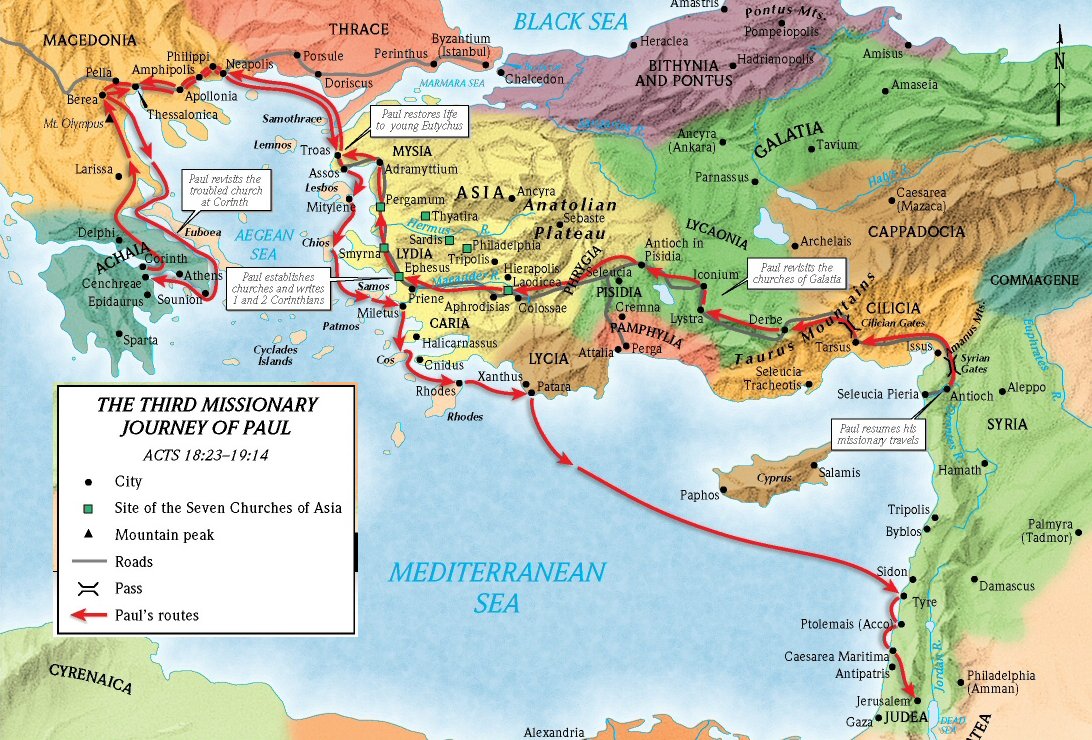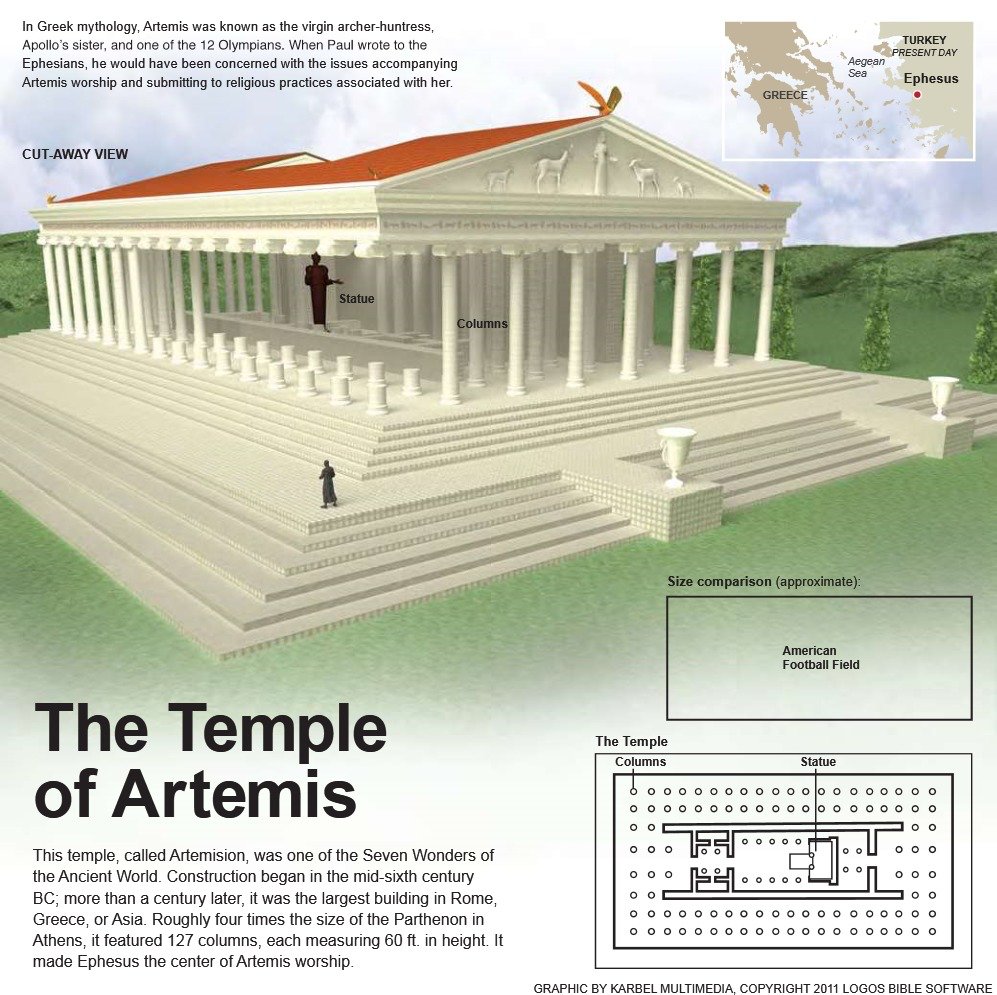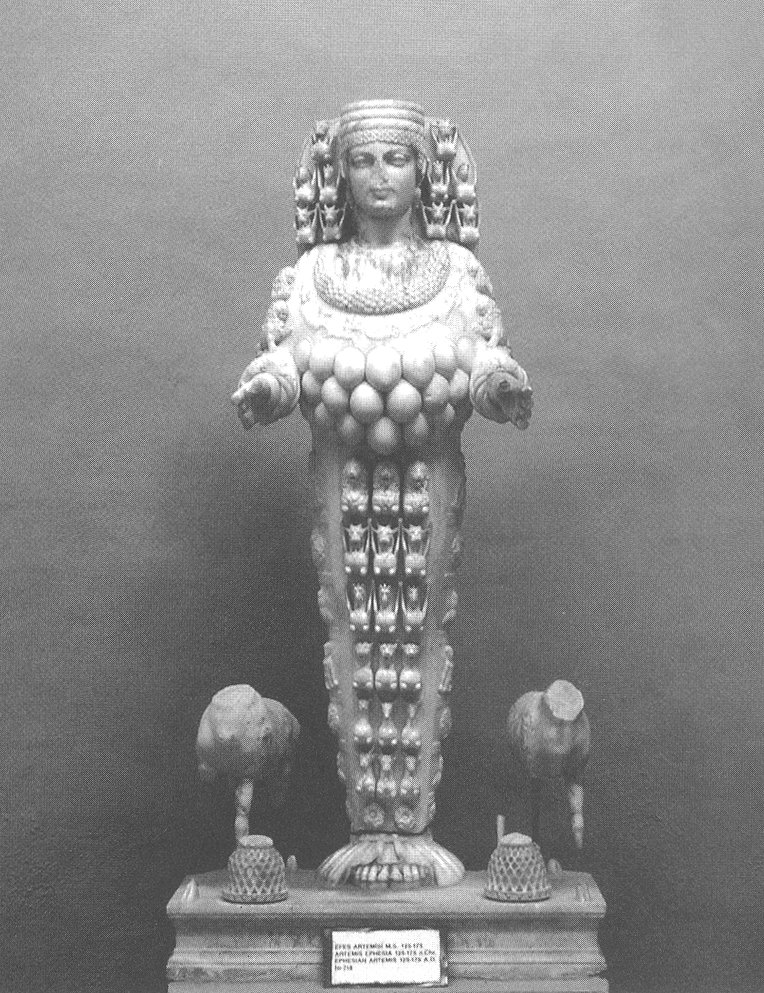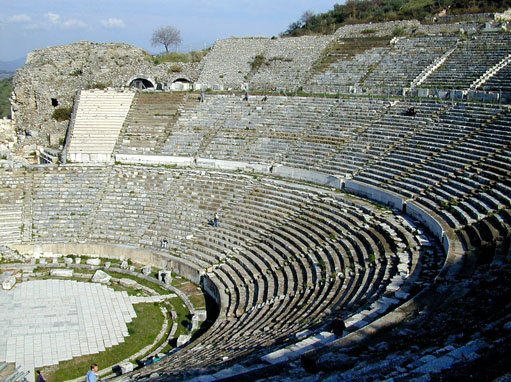Blog Post
Posted by Dion Todd August 19th, 2018 4,996 Views 0 Comments
RHM Bible Study, Acts 19 from Refreshing Hope Ministries on Vimeo.
Today we are going to study Acts chapter 19 in depth. You can follow along in your own Bible if you like. I will be reading from the World English Bible because it is the only modern English translation that is copyright free, and I can read the entire Bible on video without any legal drama or breaking anyone’s rules. After you finish this study, please take the accompanying quiz to test your knowledge. Thanks to everyone that has participated so far. Let’s get started:
First let’s set our location and do a brief catchup. In Acts chapter 18, Paul left Athens and traveled to Corinth where he met Aquila and Priscilla. There he joined them in leather working until Silas and Timothy arrived. With the financial support that they brought from Macedonia, Paul was able to being preaching full time. When trouble began to stir, he began to worry some and the Lord gave him a vision to strengthen him. After this Paul walked in a season of grace and no one could harm him. When an angry Jewish mob did try to bring Paul before the Roman proconsul Gallio, he drove them away, and the leader of the Jews was beaten by the mob instead. Paul ministered in Corinth for eighteen months and then made his way to Antioch, completing his second mission trip.

Acts Chapter 19 beginning in verse 1, reading from the World English Bible: While Apollos was at Corinth, Paul, having passed through the upper country, came to Ephesus and found certain disciples. 2 He said to them, “Did you receive the Holy Spirit when you believed?” They said to him, “No, we haven’t even heard that there is a Holy Spirit.” 3 He said, “Into what then were you baptized?” They said, “Into John’s baptism.”
Paul comes to Ephesus and finds a group of disciples there who have never heard of the Holy Spirit. Just as Apollos in chapter 18, these men had only been baptized in water, which was the baptism of John. In Acts 1:4 Jesus told His disciples:
Acts 1:4-5 WEB “Don’t depart from Jerusalem, but wait for the promise of the Father, which you heard from me. For John indeed baptized in water, but you will be baptized in the Holy Spirit not many days from now.”
These believers at Ephesus had been baptized in water, they were disciples of Jesus, but they had never heard of the baptism of the Holy Spirit, which began on the day of Pentecost in Acts chapter 2. It is an immersion in the Holy Spirit, without water, He descends on you, and it is usually accompanied by the gift of tongues.
4 Paul said, “John indeed baptized with the baptism of repentance, saying to the people that they should believe in the one who would come after him, that is, in Jesus.” 5 When they heard this, they were baptized in the name of the Lord Jesus. 6 When Paul had laid his hands on them, the Holy Spirit came on them and they spoke with other languages and prophesied. 7 They were about twelve men in all.
Paul laid hands on the twelve disciples, the Holy Spirit came on them, and they began to speak in tongues and prophesy. They were already saved, for they were called “Disciples”, but now they had the baptism of the Holy Spirit, and spiritual gifts came with it, for they spoke in tongues and prophesied.
No can deny that what Jesus promised came to earth on the day of Pentecost in the upper room in Acts chapter 2. The disciples there were filled with the Holy Spirit and began to speak in tongues. Scripture is very clear on that. Jesus promised it was coming, and it did. It is important that we see that it is still happening here about twenty-five years later.
I was taught that in one of the first churches that I attended that the gifts of the Spirit died with the last Apostle, but that is wrong and I had to “unlearn” it. To be clear, it was 120 disciples that were baptized by the Holy Spirit in the upper room, not just the Twelve Apostles. The disciples carried the gifts of the Spirit as well, and when the Apostle Paul was filled with the Holy Spirit, it was a disciple named Ananias that laid hands on him.
We should also note that Paul never met Jesus before His crucifixion, resurrection, and ascension. He was a post resurrection Apostle, and would have never became one if he had not met Jesus on the road to Damascus, and none of the other spirit filled believers around when that happened (Acts 9:4). Here at Ephesus, this was a mini-Pentecost, and it took place around twenty five years after Jesus had ascended to heaven.
What I want to make very clear is that Jesus promised to send us the Holy Spirit, that you can still receive the baptism of the Holy Spirit today, and it is important that you do. Jesus said that He was going to heaven, and that the Holy Spirit, the Counselor, the Comforter would come.
John 16:7 WEB Nevertheless I tell you the truth: It is to your advantage that I go away, for if I don’t go away, the Counselor won’t come to you. But if I go, I will send him to you.
John 16:12 WEB I still have many things to tell you, but you can’t bear them now. 13 However when he, the Spirit of truth, has come, he will guide you into all truth, for he will not speak from himself; but whatever he hears, he will speak. He will declare to you things that are coming. 14 He will glorify me, for he will take from what is mine, and will declare it to you.
The Holy Spirit descended in Acts chapter 2 on the day of Pentecost and He has never left. Our contact on earth today is the Holy Spirit, the Comforter, the Counselor. He is the One that is here with us, Jesus is in heaven seated to the right of the Father. Your day-to-day instructions will come through the Holy Spirit.
Today there are so many churches, and entire seminaries, that are filled with believers just like these disciples in Ephesus. Oh, they are saved, but they are ignorant about the Holy Spirit. They have been taught this doesn’t exist anymore. I believe this is because of three things:
1. satan does not want you to live an overcoming spirit filled life like Jesus and the Apostles did, so he covers the baptism of the Holy Spirit up in every possible way. That is why satan would love to keep you in the dark, confused, and as far away from the Holy Spirit as possible in order to keep you from being Comforted, Counseled, Taught, and Led by the Spirit as Jesus promised.
2. People cannot lead you where they have not been, so they limit their teachings to their own experience, and that is passed down to the next generation as doctrine. For example, Apollo and the disciples at Ephesus could not teach anyone about the Holy Spirit, until they first met Him themselves. If they would have written a book before they met Him, it would not have mentioned the Holy Spirit. If they would have started a denomination, it would not have taught about the Holy Spirit. On the other hand, Paul walked in the power of the Holy Spirit and understood it. He taught these men about Him. We read about the Holy Spirit and Spiritual gifts in all of Paul’s books, for he lived it. Jesus taught about the Holy Spirit. We freely give what we have received, but you can’t give what you don’t have.
3. Because of pride, many of His people are ashamed to admit there may be parts of the Bible they don’t understand yet. Saying that spiritual gifts died off in the past safely sweeps much of the New Testament under the rug. We tend to put things we don’t understand into the past, or in the future. This leads to downright bizarre teachings.
Some have even taught that the Holy Spirit baptism and the gift of tongues is evil. Many people have been taught to fear it, like its from the devil, but it is that teaching that is from the devil. We should never limit God or His word to our experience, we should never believe that we know everything there is to know. In Philippians 3:8, Paul considered all his worldly accomplishments as dung.
It seems that Jesus knew there would be people teaching fear of the Holy Spirit: “oh you better be careful, you might get an evil spirit instead!” So He took the time to make it very clear that if we ask the Father for the Holy Spirit, that we will never get something bad. Jesus said this concerning the Holy Spirit:
Luke 11:9-13 WEB “I tell you, keep asking, and it will be given you. Keep seeking, and you will find. Keep knocking, and it will be opened to you. For everyone who asks receives. He who seeks finds. To him who knocks it will be opened. “Which of you fathers, if your son asks for bread, will give him a stone? Or if he asks for a fish, he won’t give him a snake instead of a fish, will he? Or if he asks for an egg, he won’t give him a scorpion, will he? If you then, being evil, know how to give good gifts to your children, how much more will your heavenly Father give the Holy Spirit to those who ask him?”
This means that if we ask the Father to give us the Holy Spirit, that we will receive the Holy Spirit, and never get a counterfeit. We are to keep seeking, keep knocking, and keep asking until the Father gives us the Holy Spirit. It is a promise from Jesus, and we are to seek it.
How can you tell if you have the baptism of the Holy Spirit? It is usually accompanied by an unknown tongue, where you can pray in a language that you do not know. Why is it an unknown tongue? Because it is your spirit praying, and not your flesh. One example is that the Spirit will prompt you to pray for people in need, when you don’t even know they are. Another is that your own spirit will rat you out to God and tell Him all your darkest secrets, and intercede for you to be delivered from things that you would never share with anyone. You pray words that you would never say.
Though you could be baptized in the Holy Spirit and suppress the tongues, it is foolish to do so for it is a spiritual gift from God. It is something good, and not bad. It is worth nothing that almost everywhere you see the Baptism of the Holy Spirit in Scripture, those baptized began to speak in tongues. Paul wrote in 1 Corinthians 14:5 “I wish you all spoke with tongues…” and in 14:18 “I thank my God I speak with tongues more than you all…” I didn’t write it, Paul did. I just read it.
Paul laid his hands on these believers, the Holy Spirit descended on them and they were filled with the Holy Spirit. That is usually how it works, it is spread from one believer to another through the laying on of hands. But you cannot put God in a box, nor create a recipe on how He does anything. If there is one thing consistent about God that I have learned, it is that He is full of surprises. He is God, He thinks big, and He does what He wants. If you have a god that does what you want, then that is better called a pet. You should name him Bob, or Sparky. God Almighty, is no one’s pet.
A good friend of mine just went into her bedroom alone, shut the door and prayed for the baptism of the Holy Spirit. He descended on her and she began praying in tongues in about 15 minutes. Her husband fasted 10 days before It descended on him, possibly because he thought he had to earn it, or make himself worthy first. The Holy Spirit baptism varies from person to person. I have a series on the Holy Spirit here at refreshinghope.org under Pastor’s Corner if you want to know more about the Holy Spirit.
8 He entered into the synagogue and spoke boldly for a period of three months, reasoning and persuading about the things concerning God’s Kingdom. 9 But when some were hardened and disobedient, speaking evil of the Way before the multitude, he departed from them, and separated the disciples, reasoning daily in the school of Tyrannus. 10 This continued for two years, so that all those who lived in Asia heard the word of the Lord Jesus, both Jews and Greeks.
Paul spoke at the Jewish synagogue for three months, but eventually becomes “unwelcome” there. An ancient writing says that Paul rented a building from a gentile named Tyrannus for a few hours a day, and begins to teach there to a much larger audience. He held his meetings at the lecture hall from eleven in the morning to four in the afternoon. This was the time most people rested from work, including Paul, who worked to support himself while in Ephesus (Acts 20:34–35). These also may have been the “off hours” for the school of Tyrannus, and therefore it was available. The workday began at 7, broke at 11, and continued from 4 until about 9:30 at night. Paul taught everyday during those mid-day hours, and he stayed in Ephesus for about two years.
11 God worked special miracles by the hands of Paul, 12 so that even handkerchiefs or aprons were carried away from his body to the sick, and the diseases departed from them, and the evil spirits went out.
God worked special miracles through Paul, beyond the “ordinary” ones. Pieces of his belongings caused diseases and evil spirits to leave people. We can only see the full meaning of these indirect miracles, when we look deeper. The Greek word translated “handkerchiefs” in verse 12 was a Latin loanword (a word taken from another language) carrying the root meaning of sweat. These “handkerchiefs” were Paul’s sweat rags, the cloths he used to wipe away sweat while working. The “aprons” were those he wore while working with leather and making tents. Paul worked hard to support himself in a strange city, just so he could preach Christ to the lost, and God rewarded it. Paul was not selling his handkerchiefs or socks or aprons to the local faithful. They were “borrowing” them and applying them to the sick, and hopefully returning them later.
13 But some of the itinerant Jews, exorcists, took on themselves to invoke over those who had the evil spirits the name of the Lord Jesus, saying, “We adjure you by Jesus whom Paul preaches.” 14 There were seven sons of one Sceva, a Jewish chief priest, who did this.15 The evil spirit answered, “Jesus I know, and Paul I know, but who are you?” 16 The man in whom the evil spirit was leaped on them, overpowered them, and prevailed against them, so that they fled out of that house naked and wounded. 17 This became known to all, both Jews and Greeks, who lived at Ephesus. Fear fell on them all, and the name of the Lord Jesus was magnified. 18 Many also of those who had believed came, confessing, and declaring their deeds.
At the time, exorcism was a common trade full of superstition and ceremony. The best exorcists were thought to know the names of the more powerful spirits. It was also commonly believed that the Jewish priests had access to the secret name of the God of Israel and its pronunciation and so had special power over the spirit world. Renegade Jewish exorcists would add Jesus’ name to their incantations to falsely affirm their powers, but the the Lord decided to purge this bandwagon, and provided an unforgettable example.
The seven sons of Sceva thought they would have another quick exorcism and an easy buck—until they used the name Jesus. Then the demoniac rolled his frenzied eyes and said, “I know who Jesus is, and I know who Paul is, but who do you think you are?” After that, all they remembered were some rights and lefts, some kicks to the shin, the door opening, and running madly out of the house naked and wounded.
The Jewish exorcists failed because they had no personal relationship with Jesus. They only knew that Jesus was the God of Paul, and not their own God. Also evil spirits know who their enemies are, and they mentioned Jesus and Paul by name.
Darkness began to retreat. The exorcists had been attacked by an evil spirit, who should have been working with them. Confusion began to reign among the dark powers, who were now divided. As Jesus himself stated, “If a house is divided against itself, that house cannot stand” (Mark 3:25). This was the first sign of a crack in the dark city of Ephesus. And it came because of the relentless assault of one man—the courageous Apostle Paul.

Ephesus became a collecting place for superstition and the dark arts—a cesspool of the occult. Aware of this, Paul later wrote in Ephesians 6:12: “For our struggle is not against flesh and blood, but against the rulers, against the authorities, against the powers of this dark world and against the spiritual forces of evil in the heavenly realms.” Ephesus was the waterhole for every kind of magician, witch, clairvoyant, and criminal. Con artists, murderers, and perverts all found the climate of Ephesus unusually agreeable.
19 Many of those who practiced magical arts brought their books together and burned them in the sight of all. They counted their price, and found it to be fifty thousand pieces of silver. 20 So the word of the Lord was growing and becoming mighty.
Ephesus was a stronghold of satan, but after the exorcists had tried to use the name of Jesus and were judged, terror gripped the heart of many of them. They had worked hard to control evil spirits with their magic, but now a simple sweat cloth from Paul would drive them out of the people. Many of the people turned from the occult, and to Jesus. A fortune in cultic goods went up in flames in the center of the town and darkness was now in retreat. The value of fifty thousand pieces of silver today has been estimated between 1 to 5 million.
21 Now after these things had ended, Paul determined in the Spirit, when he had passed through Macedonia and Achaia, to go to Jerusalem, saying, “After I have been there, I must also see Rome.” 22 Having sent into Macedonia two of those who served him, Timothy and Erastus, he himself stayed in Asia for a while.
A significant part of the work of Timothy and Erastus was simply to help Paul. They were truly assistants to him, and helped Paul maximize his ministry. Here Paul sent Timothy and Erastus on ahead to Macedonia, while he stayed in Ephesus (Asia) for a while longer.
23 About that time there arose no small disturbance concerning the Way. 24 For a certain man named Demetrius, a silversmith who made silver shrines of Artemis, brought no little business to the craftsmen, 25 whom he gathered together, with the workmen of like occupation, and said, “Sirs, you know that by this business we have our wealth.
Paul’s preaching began to make an impact on the economy, just as in the great welsh revival of 1904, when the bars closed because no one went to them anymore. People’s hearts were changing.

A silversmith named Demetrius gathered other idol makers together to discuss this “Paul problem”. They made idols of artemis out of silver, and this was big business because so many visitors came to visit the shrine, until Paul came to town.
26 You see and hear that not at Ephesus alone, but almost throughout all Asia, this Paul has persuaded and turned away many people, saying that they are no gods that are made with hands. 27 Not only is there danger that this our trade come into disrepute, but also that the temple of the great goddess Artemis will be counted as nothing and her majesty destroyed, whom all Asia and the world worships.” 28 When they heard this they were filled with anger, and cried out, saying, “Great is Artemis of the Ephesians!” 29 The whole city was filled with confusion, and they rushed with one accord into the theater, having seized Gaius and Aristarchus, men of Macedonia, Paul’s companions in travel.

30 When Paul wanted to enter in to the people, the disciples didn’t allow him. 31 Certain also of the Asiarchs, being his friends, sent to him and begged him not to venture into the theater. 32 Some therefore cried one thing, and some another, for the assembly was in confusion. Most of them didn’t know why they had come together.
The huge confused crowd means that it may have been during the festival of Artemisia, when the city was thronged with visitors and religious and national pride was running high. It was a month of debauchery during which pilgrims came from everywhere to participate in athletic contests, drink, carouse, and have a ritual fling with prostitutes. Achilles Tatius, an eyewitness to one of these festivals, wrote this description: “It was the festival of Artemis, and every place was full of drunken men, and all the market-place was full of a multitude of men through the whole night.”
33 They brought Alexander out of the multitude, the Jews putting him forward. Alexander beckoned with his hand, and would have made a defense to the people. 34 But when they perceived that he was a Jew, all with one voice for a time of about two hours cried out, “Great is Artemis of the Ephesians!”
Alexander was a Jew and he wanted to make it clear that the Jews did not like Paul either, but he couldn’t get a word in edge ways. The Jews worshiped another God besides artemis, so they began to shout for two hours “Great is artemis of the Ephesians.”
35 When the town clerk had quieted the multitude, he said, “You men of Ephesus, what man is there who doesn’t know that the city of the Ephesians is temple keeper of the great goddess Artemis, and of the image which fell down from Zeus? 36 Seeing then that these things can’t be denied, you ought to be quiet and to do nothing rash. 37 For you have brought these men here, who are neither robbers of temples nor blasphemers of your goddess.
38 If therefore Demetrius and the craftsmen who are with him have a matter against anyone, the courts are open, and there are proconsuls. Let them press charges against one another. 39 But if you seek anything about other matters, it will be settled in the regular assembly. 40 For indeed we are in danger of being accused concerning today’s riot, there being no cause. Concerning it, we wouldn’t be able to give an account of this commotion.” 41 When he had thus spoken, he dismissed the assembly.
The town clerk was actually the highest civic official in the city of Ephesus, something like the Mayor. After two hours, he managed to quiet the shouting crowd. He had good reason. Considering Rome’s iron-fisted attitude towards such civil disorder, things were rapidly getting out of hand, and a Roman legion could be dispatched to the city to bring order. The Mayor basically told them that there were courts to hear their case, but there was no excuse to cause a riot. Then he dismissed the assembly.
This concludes today’s chapter of our ongoing Bible Study. Thank you for participating and being a part of Refreshing Hope! To complete this study, we invite you to test your knowledge with the accompanying quiz!

This blog post has an accompanying Bible quiz: Acts Chapter 19

